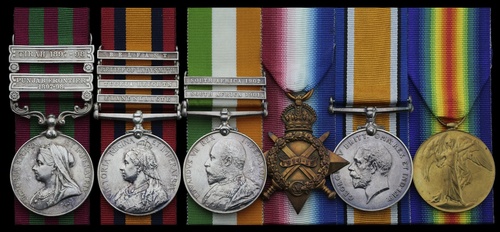
Auction: 22003 - Orders, Decorations and Medals
Lot: 220
Six: Private W. H. Gliddon, 1st Battalion, Devonshire Regiment, who was seriously wounded in action at Elandslaagte but returned to the colours for the Great War
India General Service 1895-1908, 2 clasps Punjab Frontier 1897-98, Tirah 1897-98 (3767 Pte. W. Gliddon 1st Bn. Devon. Regt.); Queen's South Africa 1899-1902, 4 clasps, Elandslaagte, Tugela Heights, Relief of Ladysmith, Belfast (3767 Pte. W. Gliddon, Devon: Regt); King's South Africa 1902, 2 clasps, South Africa 1901, South Africa 1902 (3767 Pte W. Gliddon. Devon Regt.); 1914-15 Star (15415 Pte. W. H. Gliddon. Devon R.); British War and Victory Medals (15415 Pte. W. H. Gliddon. Devon. R.), wear on the Victorian medals, nearly very fine, the remainder better (6)
William Henry Gliddon served with the 1st Battalion, Devonshire Regiment and was with them in India during their service on the Northwest Frontier and during the Tirah expedition. The Battalion was one of those rushed to South Africa in the build-up to the Second Anglo-Boer War, marching north to reinforce General White after hostilities commenced. Gliddon is confirmed as having been dangerously wounded at the Battle of Elandslaagte on 21 October 1899. Here the unit formed part of the left centre of the British line, they assaulted two detached hills, the Boer lines and then pushed past their guns. They were one of the units taken by surprise when many of the Boers disregarded the call to surrender and kept fighting after the white flag was raised. On that day, four Officers and 29 other ranks of the Battalion were wounded during the fighting with only two listed as 'dangerously wounded'. Gliddon's Relief of Ladysmith clasp suggests that he was not part of the force trapped in that city, perhaps evacuated due to his injuries and instead fought with Buller's troops on their advance over the Tugela.
On the outbreak of the Great War, Gliddon returned to the fold and served in France with the 2nd Battalion from 14 April 1915. They saw heavy fighting at Ypres before moving to the Italian front in 1917 and later returning to Italy for battles at Lys, on the Somme and the Hindenburg Line. At the end of the war Gliddon was posted to the Rifle Brigade, Base Depot and here he was awarded a Silver War Badge (No. 509437). He was finally discharged on 1 January 1919; sold together with a copied casualty roll and typed research.
Subject to 20% VAT on Buyer’s Premium. For more information please view Terms and Conditions for Buyers.
Sold for
£1,400
Starting price
£520




